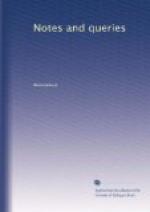J.S.W.
Stockwell, Oct. 15.
Langue Pandras.—In the Life of Chaucer prefixed to the Aldine edition of his poetical works, there is published, for the first time, “a very interesting ballad,” “addressed to him by Eustache Deschamps, a contemporary French poet,” of which I beg leave to quote the first stanza, in order to give me the opportunity of inquiring the meaning of “la langue Pandras,” in the ninth line:
“O Socrates, pleins de philosophie,
Seneque en moeurs et angles en pratique,
Ovides grans en ta poeterie,
Bries en parier, saiges en rethorique,
Aigles tres haulte qui par ta theorique
Enlumines le regne d’Eneas
L’isle aux geans, ceulx de Bruth,
et qui as
Seme les fleurs et plante le rosier
Aux ignorans de la langue Pandras;
Grant translateur, noble Geoffroy Chaucier.”
May I ask, further, whether any particulars are known of this contemporary and admirer of Chaucer?
I hope I shall not be deemed presumptuous if I add that I should have doubted of the genuineness of the poem quoted from, if Sir Harris Nicolas had not stated that it had been communicated to him by “Thomas Wright, Esq., who received it from M. Paulin Paris,” gentlemen in every way qualified to decide on this point, and being sanctioned by them, I have no wish to appeal from their judgment.
J.M.B.
The Coptic Language.—I read in The Times of this morning the following:
“The Coptic is an uncultivated and formal tongue, with monosyllabic roots and rude inflexions, totally different from the neighbouring languages of Syria and Arabia, totally opposite to the copious and polished Sanscrit.”
Do you think it worth while to try if some Coptic scholar among your learned correspondents can give us some clearer account of the real position of that tongue, historically so interesting? {377} The point is this, Is it inflected, or, does it employ affixes, or is it absolutely without inflections and affixes?
If the first, it cannot be “totally opposite” to the Sanscrit: if the second, it cannot be “totally different” from Syriac and Arabic: if the third, it cannot have “rude inflections.”
J.E.
Oxford, October 23. 1850.
Cheshire Cat.—Will some of your correspondents explain the origin of the phrase, “grinning like a Cheshire cat?” The ingenious theory of somebody, I forget who, that Cheshire is a county palatine, and that the cats, when they think of it, are so tickled that they can’t help grinning, is not quite satisfactory to
K.I.P.B.T.
Mrs. Partington.—Where may I find the original Mrs. Partington, whose maltreatment of the Queen’s English maketh the newspapers so witty and merry in these dull days?
IGNORANS.
Cognation of the Jews and Lacedemonians.—In the 12th chapter of the 1st Book of Maccabees the letter of Jonathan, the High Priest, to the Lacedemonians is given, in which he claims their amity. This is followed by a letter of Arcus, the Spartan king, in answer, and which contains this assertion:




